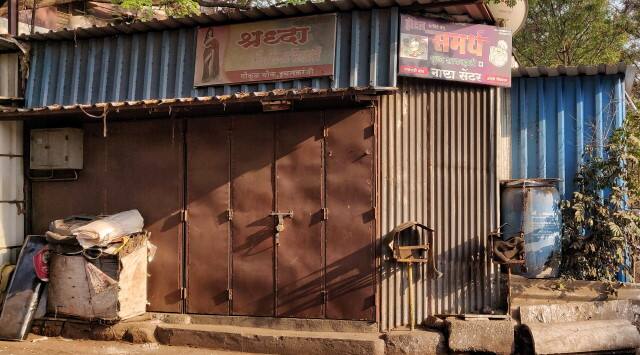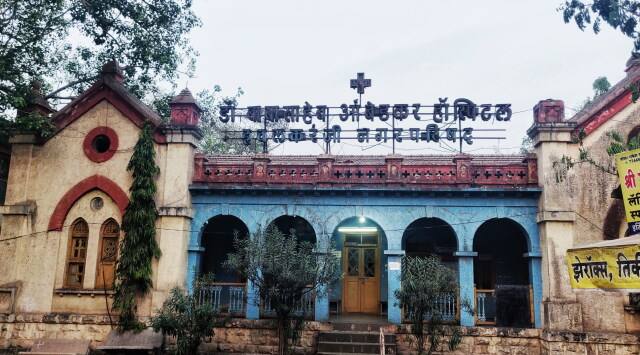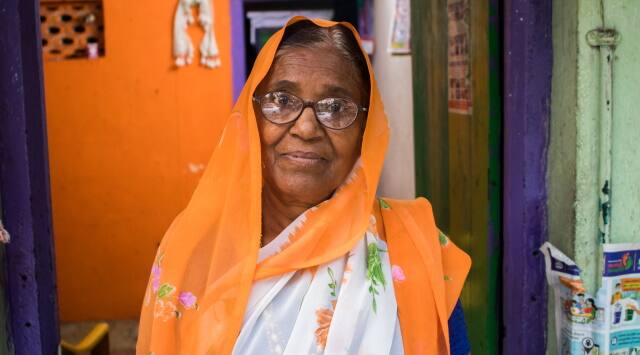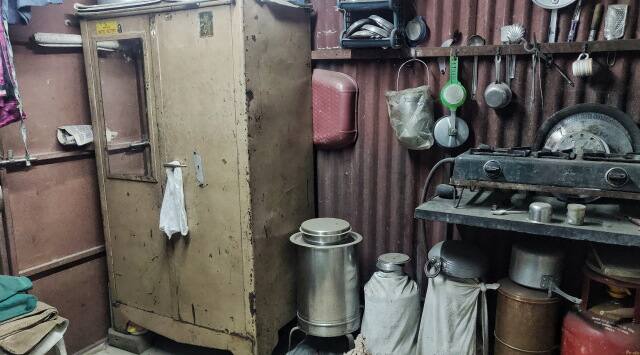This story is part of a series on the everyday heroes of rural Maharashtra . When Chhaya Naik visited the public hospital in the late 1970s, she was scared. The task at hand was much bigger than her fear of the biomedical equipment and the authorities. 27-year-old Chhaya had to get an unconscious Meena Kamble*, an agricultural labourer, admitted to Dr Babasaheb Ambedkar Hospital in Ichalkaranji town of Maharashtra’s Kolhapur district. Within ten minutes of reaching the hospital, she found there was more to her fear. Perhaps what was scarier was the apathy of the medical officials towards the pidit (marginalised). “They just wouldn’t admit her,” she recollects at her daughter’s house in 2021. Upon enquiring, Chhaya was asked to complete the paperwork. “They kept delaying it.” She had to pressurise the officials, only after which the procedure began. During the entire week-long treatment, none of Meena’s family members visited her. After a few days, when she felt better, Chhaya found she was from the nearby village of the Hatkanangle taluka. “After being discharged, her family members weren’t willing to take her home. Even today, we don’t know why they did that.” Chhaya was consistently following up and single-handedly taking Meena’s care. “I found there’s a separate section in the hospital for homeless people.” She was then enrolled there. “After two weeks, she died of a heart stroke.” The incident left a deep mark on Chhaya – who then made it her mission to make public hospitals accessible for women. Over the next four decades, Chhaya, now a 70-year-old, would go on to help several hundreds of women avail of their right to healthcare and timely treatment in the Ichalkaranji town. During the same time, she was dealing with personal struggles. A few years after her marriage (at the age of 17), her husband, the late Suresh, married another woman. “He would tell me, ‘Tu dekhni navhati (You aren’t beautiful).’” She remembers the horrific incidents where, “For three years, he would beat me after drinking alcohol.” She left the house and returned to her parents. “For four-five years, my father sheltered me and then asked to leave.” Devastated, she stayed on roads for a few days, says a teary-eyed Chhaya. A kind neighbour, Shaukat Salgar, bought her a small tin shanty that remains her makeshift house even today. Meanwhile, she opted for a divorce, whose hearing would go on for several years. The Ichalkaranji court had ordered Suresh to pay alimony of Rs 100 monthly. “100 was a big amount during that time,” she recalls. [caption id=“attachment_9539971” align=“alignnone” width=“640”]  Chhaya has spent a major part of life staying in the makeshift tin shanty which was evicted thrice by the local civic body.[/caption] For several months, he didn’t pay the amount and once gave her Rs 500. With such irregularities, Chhaya filed another case. “The court issued an arrest warrant. Even after that, he shamelessly asked me to lend Rs 1,000 for his bail,” she remembers. Using Rs 500, she bought a sewing machine. “I learned tailoring, and even today, I continue doing it,” says Chhaya proudly. “Always, my young daughter came to my mind when I had suicidal thoughts.” If I die, what will happen to her? she kept thinking. With some sewing orders, Chhaya managed to make ends meet and ensure her daughter’s schooling. “Often women left by their husband would come to me.” They discussed what could be done next. In the late 70s and the early 80s, Chhaya began attending the rallies of KL Malabade, a workers’ leader from the Communist Party of India (Marxist) known for his voracious speeches. He was elected as a member of Maharashtra’s legislative assembly in 1990. “Thousands of workers would listen to his speeches,” she says. This had an impact on Chhaya as she would spend hours trying to make sense of everything she has been through. That’s when she realised, “We have a responsibility to help others.” While this thought kept whispering in her head, it was a meeting with Comrade Malabade that convinced her to help others, despite personal circumstances. Starting at the age of 27, she regularly began visiting the King Edward Memorial Hospital (later renamed Dr Babasaheb Ambedkar Hospital) to understand more about the available facilities and infrastructure. She observed that the pregnant women were never admitted on time, and the treatment was always delayed. “How can someone do this in such a serious condition?” she asks. That’s when she began holding the medical staff accountable and would ask them to call the chief medical officer. “When the hospital officials didn’t listen to us or delayed the treatment, we began protesting at the hospital’s gate.” Together with six other daily wage women earners, Chhaya decided to fight back. They were Jainafbi Nadaf, Parvati Jadhav, Hirabai Morbale, Vasanti Kolekar, late Shevantabai Rajigre, and late Shalan kininge. Soon, everyone in the community began addressing them as comrades. “Amcha marg shantetcha (Our path was of non-violence),” says Chhaya. Consistently, they enquired about the availability of the medicines, and in case any were unavailable, followed up with the senior officials. Some patients couldn’t afford the costly medicines. In such cases, she checked if they had a Below Poverty Line ration card. “In case, they didn’t have one, I would do all the paperwork and fight with the Nagarparishad officers to issue them a card immediately.” To date, Chhaya has helped over 500 people with ration cards and free medicines and hasn’t charged a single rupee for this. “In the 1990s, the case paper fee was Rs 1 that has now increased to Rs 10,” says Jainafbi, now in her early 70s. The Ambedkar hospital where they would protest was later converted to a police station, while Indira Gandhi Memorial (IGM) was constructed as a replacement in the early 1990s. [caption id=“attachment_9539931” align=“alignnone” width=“640”]  Dr Babasaheb Ambedkar hospital, which is now dysfunctional, and converted to a police station.[/caption] For them, being blunt and rude to any officer was never the solution. “Often doctors would fear they will be held responsible and beaten up in case something happens to the patient.” During such times, these women took the responsibility. “If you ease their burden, they take up the cases quickly,” says Chhaya. While it sounds simple, often it brought its share of troubles; like an incident in the late 80s when a factory worker collapsed. “It was a heart attack,” recalls Chhaya, who rushed him to the hospital. Within a few minutes he was pronounced dead. “There’s a police enquiry in such cases. First, I figured out who the worker was and went directly to the factory.” After enquiring for hours Chhaya managed to source the family details and informed them. “The police didn’t trouble me because I had made things clear,” she says. The most challenging cases for Chhaya were the ones involving alcoholic men. “Men would drink so much they had to be admitted.” The 2005 floods proved to be a challenging one. “There were several cases of diarrhoea, cholera, and typhoid because of the dushit (polluted) water.” For several weeks, they were busy taking patients to the hospital. “Several people had lost their houses to the flood, and these diseases made it much worse,” she says. Things would get difficult because of the unavailability of required machines. During such times, they had to rush the patients either to Kolhapur or Sangli. This meant skipping the day’s work or daily earnings. “For us, the first priority is helping others,” she says. The Economic Survey of India published in January 2021 mentions, out of 189 countries, India ranks 179th in ‘prioritisation accorded to health in its government budgets’. “A few doctors would praise us for holding them accountable. There was one doctor named Jadhav, who would always thank me,” she says proudly. “You are doing good work, and the least we can do is help you,” he told Chhaya. Sikandar Nadaf, 55, Jainafbi’s son, says, “I always saw my mother fighting for women patients at the gates of IGM hospital. For them, a protest was common.” [caption id=“attachment_9539941” align=“alignnone” width=“640”]  Jainafbi Nadaf, now in her early 70s, was one among the seven women who held the public medical officers and doctors accountable.[/caption] Jainafbi explains why several doctors denied a treatment. “They wanted people to visit their private clinics so they could earn more. We would never let that happen though.” As per the 71st NSS health report, 2014, “More than 70 percent (72 percent in rural and 79 percent in urban) spells of ailment were treated in the private sector.” The same report further says, “As high as 86 percent of rural population and 82 percent of urban population were not covered under any scheme of health expenditure support.” None of them feared the police. In 1972, Jainafbi was part of massive Jail Bharo Andolan, where she was detained in Pune’s Yerwada jail with 500 other people from Ichalkaranji for three months. “We had no option. Despite the worst drought, the Government wasn’t helping the people. So we would say, let’s go to jail. We will at least get some food there.” Chhaya and her group would help women with any medical condition get a timely diagnosis and treatment for free at the IGM hospital. “We woke up doctors at midnight for any medical emergency. They couldn’t say a no to us,” says Jainafbi proudly. For none of the seven women it was an easy task, especially with the burden of what life had been to everyone. [caption id=“attachment_9539981” align=“alignnone” width=“640”]  Inside Chayya Naik’s tin shanty, where she continues her tailoring work even today.[/caption] “In 1999, the nagar parishad (Municipal Council) evicted 3,500 tin shanties including mine citing encroachment,” says Chhaya, adding that it was done for the third time. Even today, she stays in the same 8x6 feet roadside tin shanty and gets a monthly pension of Rs 1,000 under the Indira Gandhi Niradhar Yojana. In 2020, Chhaya underwent coronary bypass surgery in the Sangli town, and ever since has been staying with her daughter, Ashwini. Talking about her struggles, she says, “I have spent an entire life fighting – sometimes with myself, my circumstances, or officials. It’s a life spent in kranti (revolution).” *Name changed to protect identity. All photographs by the author.
For none of the seven women it was an easy task, especially with the burden of what life had been to everyone.
Advertisement
End of Article


)
)
)
)
)
)
)
)
)



